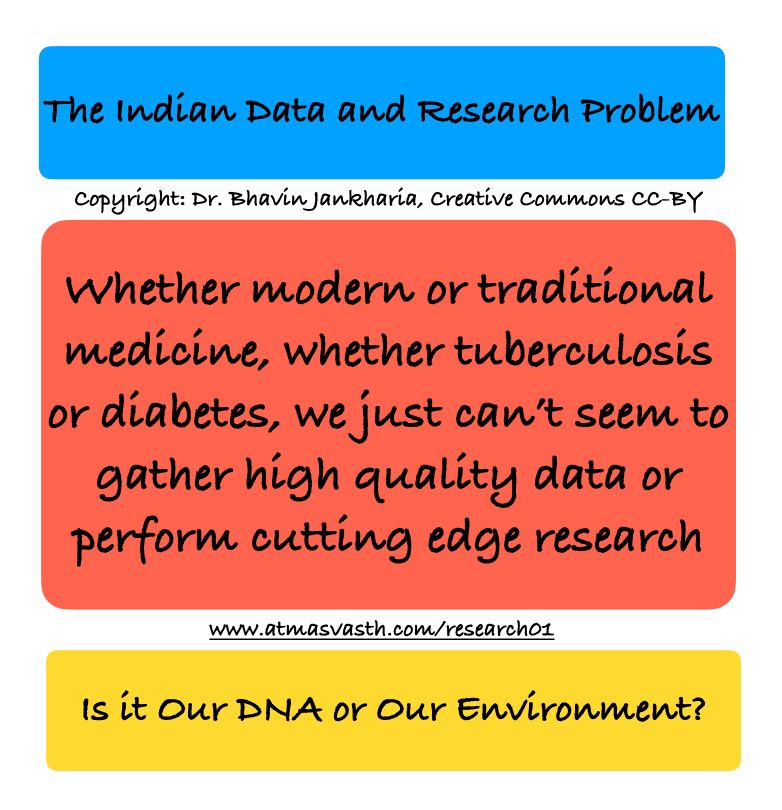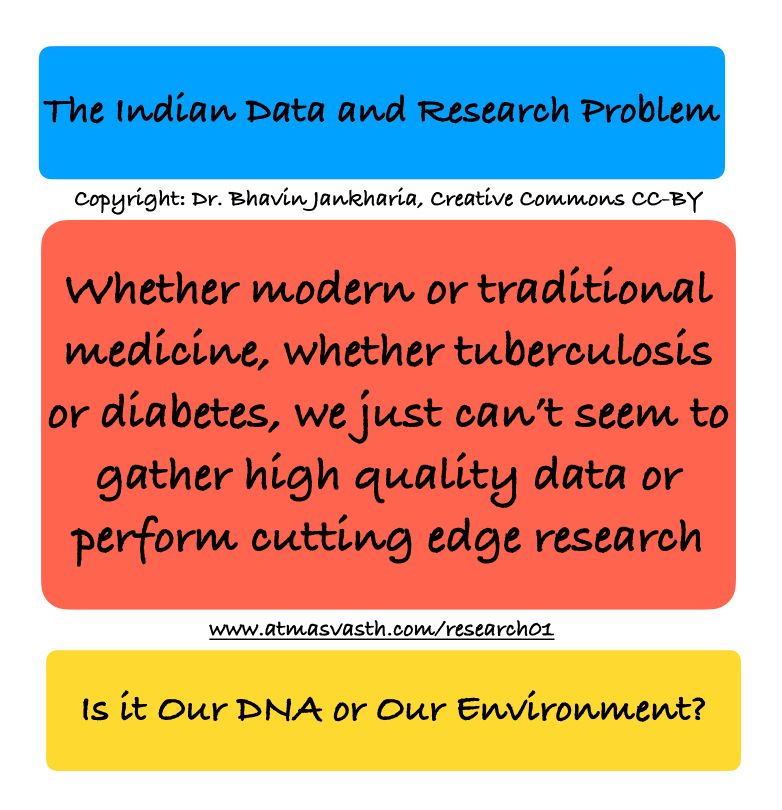The Indian Data and Research Problem - Is it our DNA or our Environment?
Whether modern of traditional medicine, whether tuberculosis or diabetes, we just can't seem to do high quality research

If you read Rukmini S’s book, Whole Numbers and Half Truths, the one thing that hits you is how poor we are at data collection, and if we do have data, then at using those numbers appropriately to understand the situation on the ground. Not only do we not know how many doctors actually practice in India, we also don’t know who earns what and works where, forget about data on how many patients have tuberculosis or malaria or how many kids suffer from malnutrition. We don’t even know how many people have died of Covid-19. Most numbers from and in India are just guesstimates.
The same is true of research. Whether it is tuberculosis or malaria or dengue or diabetes or any of the diseases where India is a world leader, we are so poor in our research, that we have no option but to follow guidelines developed in other countries. We are good executors, but as a rule, poor researchers.
The invasion from the West was not just of our land and its wealth. The West conquered our systems and our minds, too. In less than 200 years, Western medicine became the de facto medicine system of choice worldwide, relegating all other traditional systems of medicine to second place.
Modern medicine has checks and balances in place that demand proof. Proof that a particular form of medicine or surgery works, proof that the side effects are few or acceptable in the context of the treatment and proof that in the end whatever we do hopefully helps us live long, healthy. Once we have accepted modern medicine willingly or otherwise, we have to play the game set by the new rules of modern medicine, which means doing research the way modern medicine dictates, which includes data management, running complex statistics on numbers especially when doing observational trials, doing randomized controlled trials and publishing in high quality and high impact journals.
Look at this paper [1] that was published out of China on the benefits of a Chinese herbal medicine compound compared to losartan for mild essential hypertension (raised blood pressure). It was a randomized controlled study that showed that the Songlig Xuemaikang capsule was safe, well tolerated and noninferior to losartan, which means it can be used as an alternative to losartan. Why can’t we do trials like these with traditional Indian medicines?
Each week, we have advertisements from Patanjali Ayurved and other similar companies, touting the benefits of its formulations for the treatment of hypertension, diabetes, etc…but with no research to back these claims. A cursory Pubmed search does not show up any high quality research that would prove the efficacy of traditional medicine. It is possible that traditional medicine formulations do work, given that they have been around for over 2500 years, but in today’s day and age, we need to play the game according to the rules set by modern medicine and prove that these formulations work rather than just relying on anecdotes and faith. Until we do this, traditional medicine will be nothing but fringe medicine.
Take yoga for example. I believe yoga helps and I practice it thrice a week. But if you try and see the data on yoga and its health benefits, it is sparser than the cars on the streets of Mumbai during the April 2020 lockdown. And yet, people swear by yoga…and that’s fine because if physical activity is a magic pill, and yoga is a form of physical activity, then by extension, yoga should improve our healthspan and lifespan. But yoga will never find its place in the sun as far as its health benefits are concerned, until we find direct proof showing that yoga actually makes an objective difference to physical and mental health.
There is a lot we don’t know about what keeps us healthy. Some decisions at a population level are often taken based on intuition and laboratory research, e.g. laws to reduce noise pollution or seat-belt mandates, with the understanding that these interventions can only help and not harm. But when it comes to medicines and vaccines that we ingest or inject into our bodies, we need to prove usefulness and efficacy.
It is so funny that the same Indian researchers who falter in India, flower when they go abroad. In India, whether it is our DNA, the air we breathe, the soil, the food we eat…something somehow prevents us from being the world leaders that we could be in managing the diseases that we are world leaders in, irrespective of what form of medicine it is.

How does this affect you and I? There is so much that India can contribute to improving healthspan and lifespan by mining the data from our large population, conducting high quality research and using the wealth of information in traditional medicine to give cheaper and perhaps safer drugs to the World. If by doing this, we can improve the healthspan and lifespan of all Indians, ours improve in tandem.
Footnotes
1. Lai X et al. Circ Cardiovasc Qual Outcomes. 2022 Feb 2:CIRCOUTCOMES121007923
Atmasvasth Newsletter
Join the newsletter to receive the latest updates in your inbox.